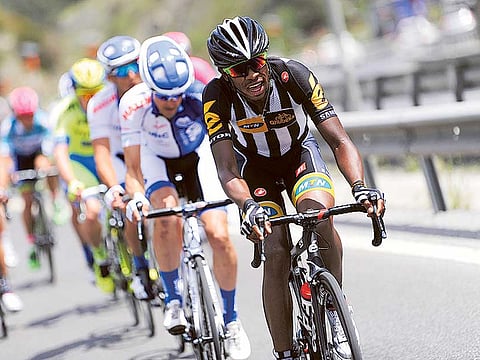‘In 5-10 years we’ll have a black African Tour de France winner’
MTN Qhubeka’s Songezo Jim says African development is making cycling a sport for all

Abu Dhabi: Team MTN Qhubeka made history this year when it became the first all African outfit to compete in the Tour de France. As a result, Eritrean cyclists Daniel Teklehaimanot and Merhawi Kudus became the first black Africans to compete for the coveted yellow jersey, with Teklehaimanot becoming the first black African to don the ‘King of the Mountains’ polka dot jersey, from stages six to nine.
But as well as being a professional cycling unit promoting African talent, Qhubeka, which means ‘to progress’ or ‘move forward’ in Ngoni (Zulu, Xhosi) is also a non profit organisation aiming to supply 5,000 underprivileged children throughout Africa with bikes by the end of the year through their #BicyclesChangeLives campaign.
In order to know just how bicycles change lives the team don’t have to look much further than their teammate Songezo Jim, who was orphaned aged 12 and only learnt how to ride a bike at 14, after the Cape Argus race passed by his aunt’s house.
The 25-year-old recently became the first black South African to finish a cycling grand tour when he completed the Vuelta a Espana in September. And now he’s hoping to break into next year’s Tour de France squad with next week’s Abu Dhabi Tour from October 8-11 an important stepping stone in his progress. Gulf News caught up with Jim ahead of his participation.
GULF NEWS: How was your grand tour debut?
SONGEZO JIM: It went really well for both my team and myself, we managed to win a stage [stage ten went to MTN Qhubeka’s Kristian Sbaragli] and I managed to get into two breakaways on stage nine and 18, which is really good for my first grand tour.
What does the Abu Dhabi Tour mean to you in the greater scheme of things?
It’s a good opportunity to get back up to speed following some rest after the Vuelta a Espana. I had a look at the stages and think stage three will be the most challenging. I’m looking forward to competing somewhere new and representing our team out there. We will see, if I get my chance I would like to show myself. I think it’s a race that can help me in my progression as a rider.
With this experience could you now aim towards competing in the Tour de France?
That’s one thing I can’t decide. Competing in my first grand tour has hopefully given me more chance of making the Tour de France squad next year but I can’t say, the management decide but for myself I hope to make the team either next year or the year after.
Has Teklehaimanot and Kudus’ Tour de France debut given you hope?
It does give me hope because we train and do races together but aside from that I don’t need hope because I know what I’m capable of doing. The team expects more so I will do my best and give more to try and break into the squad.
How soon before a black African wins the Tour de France and can you be that man?
It’s not easy to win a Tour de France but within five to ten years maybe we’ll have a black African winner. This year’s progress [by Teklehaimanot and Kudus] has been a step towards that. When I was growing up it was my dream to win a Tour de France, but as a kid you dream, you don’t plan. Only kids can wish, but at this stage now I know what I’m capable of doing. To win a stage will be a dream come true for me and would have a massive effect on the growth of the sport amongst kids in Africa. But I’m not a pure hill climber and not the best time trialist and in order to win a stage you need both those things and I know I’m not one of those.
How important is it to you that the team also has a humanitarian role?
The charitable aspect plays a big part in what we do. Qhubeka doesn’t just give bikes to kids. They have to plant trees in their community in order to earn the bike, so it teaches them that nothing comes for free and that you have to work for everything in life. I know exactly how it feels to be one of those kids and I am happy to be working on a project that reaches out to them. If one kid gets a bike it means he or she doesn’t have to walk to school and they can save time and effort to spend on their studies or partake in a sport after school.
How has cycling changed your life and has it helped you overcome tragedy in your childhood?
Cycling has had a massive impact on my life, I’ve learnt so much about myself and others through my travels. I’ve been all over the world and met different people and learnt about other cultures. And yes, there is so much back and forth with training, sometimes you think too much if you have too much time on your hands and you end up overthinking [about the past] but now I don’t have so much time on my hands because I’m always cycling.
Sign up for the Daily Briefing
Get the latest news and updates straight to your inbox


